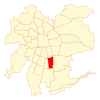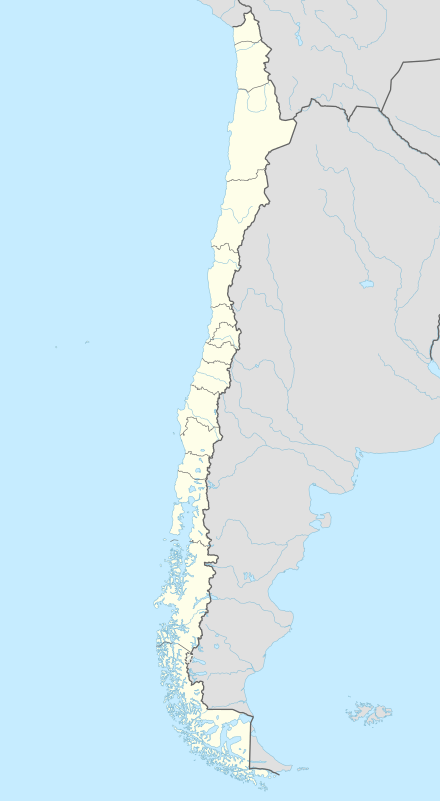La Granja, Chile
| Puente Alto | |||||
|---|---|---|---|---|---|
| City and Commune | |||||
| |||||
| Coordinates (city): 33°32′S 70°37.5′W / 33.533°S 70.6250°WCoordinates: 33°32′S 70°37.5′W / 33.533°S 70.6250°W | |||||
| Country | Chile | ||||
| Government[1] [2] | |||||
| • Type | Municipality | ||||
| • Alcalde | Felipe Delpin Aguilar (DC) | ||||
| Area[3] | |||||
| • Total | 10.1 km2 (3.9 sq mi) | ||||
| Population (2002 Census)[3] | |||||
| • Total | 132,520 | ||||
| • Density | 13,000/km2 (34,000/sq mi) | ||||
| • Urban | 132,520 | ||||
| • Rural | 0 | ||||
| Sex[3] | |||||
| • Men | 64,750 | ||||
| • Women | 67,770 | ||||
| Time zone | CLT [4] (UTC-4) | ||||
| • Summer (DST) | CLST [5] (UTC-3) | ||||
| Area code(s) | 56 + | ||||
| Website | Municipality of La Granja | ||||
La Granja (Spanish for "the farm") is a commune of Chile located in Santiago Province, Santiago Metropolitan Region.
Demographics
According to the 2002 census of the National Statistics Institute, La Granja spans an area of 10.1 km2 (4 sq mi) and has 132,520 inhabitants (64,750 men and 67,770 women), making the commune an entirely urban area. The population fell by 0.6% (765 persons) between the 1992 and 2002 censuses.[3] The 2006 projected population was 129,707.[6]
Stats
- Average annual household income: US$14,662 (PPP, 2006)[6]
- Population below poverty line: 14.2% (2006)[7]
- Regional quality of life index: 77.93, mid-high, 18 out of 52 (2005)
- Human Development Index: 0.689, 158 out of 341 (2003)[8]
Administration
As a commune, La Granja is a third-level administrative division of Chile administered by a municipal council, headed by an alcalde who is directly elected every four years. The 2012-2016 alcalde is Felipe Delpin Aguilar (DC).[1][2] The communal council has the following members:
- Cristián Carmona Macaya (DC)
- Rodrigo Quezada Arriagada (IND)
- Juan Valdés Valdés (PS)
- Germán Pino Maturana (PPD)
- Sergio Robles Pinto (PC)
- Silvana Poblete Romero (PS)
- Berta Venegas Maldonado (DC)
- Patricio Oyarce Bravo (UDI)
Within the electoral divisions of Chile, La Granja is represented in the Chamber of Deputies by Felipe Salaberry (UDI) and Ximena Vidal (PPD) as part of the 25th electoral district, (together with Macul and San Joaquín). The commune is represented in the Senate by Soledad Alvear (PDC) and Pablo Longueira (UDI) as part of the 8th senatorial constituency (Santiago-East).
References
- 1 2 "Asociación Chilena de Municipalidades" (in Spanish). Retrieved 27 January 2011.
- 1 2 "Municipality of La Granja" (in Spanish). Retrieved 27 January 2011.
- 1 2 3 4 "National Statistics Institute" (in Spanish). Retrieved 13 December 2010.
- ↑ "Chile Time". WorldTimeZones.org. Retrieved 26 September 2010.
- ↑ "Chile Summer Time". WorldTimeZones.org. Retrieved 26 September 2010.
- 1 2 "System of Regional Information". Ministry of Planning of Chile (in Spanish). Retrieved 13 September 2010.
- ↑ "Poverty in the Santiago Metropolitan Region" (PDF). Ministry of Planning of Chile (in Spanish). Archived from the original (PDF) on August 24, 2007.
- ↑ "The Trajectories of Human Development in the Communes of Chile (1994-2003)" (PDF). Government of Chile, Mideplán. UNDP. Retrieved 13 September 2010.
.svg.png)


